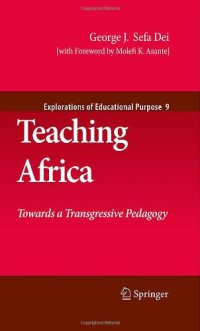
Ebook: Teaching Africa: Towards a Transgressive Pedagogy
Author: George J. Sefa Dei (auth.)
- Genre: Education
- Tags: Non-Western Philosophy, Philosophy of Education
- Series: Explorations of Educational Purpose 9
- Year: 2010
- Publisher: Springer Netherlands
- Edition: 1
- Language: English
- pdf
Written from the perspective of a knowledge base and educational practice that are both African-centred, this volume uses a discursive pedagogy that is anti-colonial in origin. It theorizes colonial – and re-colonial – relations and the implications of imperial structures on knowledge production and use; the understanding of indigenousness; and the pursuit of agency, resistance and subjective politics.
Using a refined definition of colonial, less as ‘foreign’ or ‘alien’ but more ‘imposed and dominating’, the author shows us how colonialism is domesticated and how those who have been oppressed by dominant/hegemonic discourses may find it difficult to step out of them, let alone challenge or resist them. The book is a call for a critical interrogation of dominant knowledge about Africa in order to help the contemporary learner come to grips with the challenges and possibilities of knowing about the African world and the African human condition.
The author’s anti-colonial discursive platform addresses distorted Eurocentric views of Africa, raises ontological and epistemological questions about teaching methods and methodologies relating to Africa, and highlights knowledge indigenous to Africa. At the same time, it shows what the rest of the world can learn from this knowledge.
Written from the perspective of a knowledge base and educational practice that are both African-centred, this volume uses a discursive pedagogy that is anti-colonial in origin. It theorizes colonial – and re-colonial – relations and the implications of imperial structures on knowledge production and use; the understanding of indigenousness; and the pursuit of agency, resistance and subjective politics. Using a refined definition of colonial, less as ‘foreign’ or ‘alien’ but more ‘imposed and dominating’, the author shows us how colonialism is domesticated and how those who have been oppressed by dominant/hegemonic discourses may find it difficult to step out of them, let alone challenge or resist them. The book is a call for a critical interrogation of dominant knowledge about Africa in order to help the contemporary learner come to grips with the challenges and possibilities of knowing about the African world and the African human condition. The author’s anti-colonial discursive platform addresses distorted Eurocentric views of Africa, raises ontological and epistemological questions about teaching methods and methodologies relating to Africa, and highlights knowledge indigenous to Africa. At the same time, it shows what the rest of the world can learn from this knowledge.